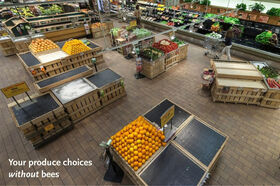“The fact is that of the 100 crop species that provide 90 per cent of the world’s food, over 70 are pollinated by bees.”- UN report.
It is true that much of human existence is presently dependent on honey bees. However, the human race is not likely to become extinct. Food production would decline, but not completely disappear.[1] People will see that the grass is still green; the world would not instantly turn into a desert in a world without bees.[2]
Summary

We could theoretically support a global population of up to 500 million without bees. While our produce shelves would look bare, groceries stories could stock up on other merchandise to compensate.
There are plenty of food sources that don't need bees to pollinate. If the bees became extinct, the plants that depend on bees for pollination will die. Wheat, barley, rye, rice, bamboo and corn are pollinated solely by the wind. Butterflies are also one of the major pollinators in addition to birds. Pears can be pollinated by hand after the bees go extinct, just like in southern Sichuan.[3] This costly labor intensive hand pollinating process[4] would bring hundreds of jobs where people would dip feathered sticks into pollen and dab each individual flower on each individual tree.[3]
Most plants depend on insects like bees to pollinate them. Those plants which are entirely dependent on bees would gradually die off without reproducing, unless some other animal (insects, birds, bats, etc) inserted themselves into that biological niche. One source of photosynthesis that is independent of insects is in water. Algae has a tremendous influence on the world's oxygen production, so oxygen would not disappear. But because many trees and flowering plants depend on bees for their reproductive cycle, they would be highly stressed, and either would have to adapt to life without bees or become extinct.
Plants have been pollinated by a wide variety of animals in North America way before the honey bee became established.[5] An increase of flies, beetles, thrips, butterflies, and moths would fill the void as pollinators in a world where bees were either extinct or never existed at all....[6]
References
- ↑ http://www.culinate.com/articles/sift/colony_collapse_disorder Population crash - Can the honey bee recover?
- ↑ http://www.beesustainable.com/commitment.html Bee Sustainable
- ↑ 3.0 3.1 http://www.struanstevenson.com/media/article/why_we_must_protect_our_bees Why We must protect our bees
- ↑ http://www.homeecofriendly.com/global-news/honey-and-the-bees Honey and the Bees
- ↑ http://answers.yahoo.com/question/index?qid=20090108215027AAvL0SC Are honey bees going extinct? If so, why?
- ↑ http://perspectives.com/forums/view_topic.php?id=142197&forum_id=73&page=2 Massive Honey Bee Die-Off
http://www.un.org/apps/news/story.asp?NewsID=37731#.UXnYiCuJVJk
